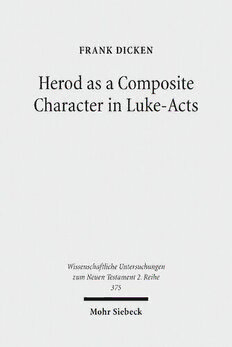
Herod as a Composite Character in Luke-Acts PDF
225 Pages·2014·2.957 MB·English
Most books are stored in the elastic cloud where traffic is expensive. For this reason, we have a limit on daily download.
Preview Herod as a Composite Character in Luke-Acts
Description:
Frank Dicken offers a new perspective on the three rulers who appear in Luke-Acts with the name "Herod," contending that in light of their similar narrative depictions they may be construed as a composite character, i.e., a single character in the narrative. Viewing the Lukan Herods alongside other composite characters in Jewish and early Christian literature, the author then compares and contrasts the portrayal of the Herods in Luke-Acts with what is known about the Herods historically. Thereby he highlights two unique features - the title "King of Judaea" at Luke 1:5 and the name "Herod" for Agrippa I in Acts 12 - that result in construing the Herods as a composite. A reading of Luke-Acts focusing on each passage in which composite "Herod" appears demonstrates that understanding "Herod" as a single character is possible. Finally, Frank Dicken examines the characterization of composite "Herod" as an antagonist who embodies satanic opposition toward the spread of the gospel in the Lukan narrative.
See more
The list of books you might like
Most books are stored in the elastic cloud where traffic is expensive. For this reason, we have a limit on daily download.
